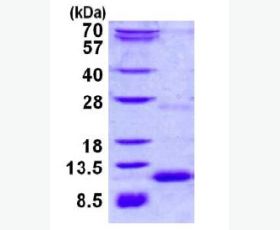Recombinant Human β-Defensin 1/DEFB1
| Product name: | Recombinant Human β-Defensin 1/DEFB1 |
| Source: | E.coli |
| Purity: | Greater than 95% as determined by reducing SDS-PAGE. |
| Buffer Formulation: | Lyophilized from a 0.2 μm filtered solution of 20mM PB, 130mM NaCl, pH 7.4. |
| Applications: | Applications:SDS-PAGE; WB; ELISA; IP. |
| Storage: | Avoid repeated freeze/thaw cycles. Store at 2-8 oC for one month. Aliquot and store at -80 oC for 12 months. |
| UOM: | 100ug/50ug/200ug/1mg/1g |
| Source | E.coli |
| Description | Recombinant Human beta-Defensin 1 is produced by our E.coli expression system and the target gene encoding Gly22-Lys68 is expressed. |
| Names | Beta-Defensin 1, BD-1, hBD-1, Defensin Beta 1, DEFB1, BD1, HBD1 |
| Accession # | P60022 |
| Formulation | Lyophilized from a 0.2 μm filtered solution of 20mM PB, 130mM NaCl, pH 7.4. |
| Shipping |
The product is shipped at ambient temperature. |
| Reconstitution |
Always centrifuge tubes before opening. Do not mix by vortex or pipetting. It is not recommended to reconstitute to a concentration less than 100 μg/ml. Dissolve the lyophilized protein in ddH2O. Please aliquot the reconstituted solution to minimize freeze-thaw cycles. |
| Storage |
Lyophilized protein should be stored at < -20°C, though stable at room temperature for 3 weeks. Reconstituted protein solution can be stored at 4-7°C for 2-7 days. Aliquots of reconstituted samples are stable at < -20°C for 3 months. |
| Purity |
Greater than 95% as determined by reducing SDS-PAGE. |
| Endotoxin | Less than 0.1 ng/µg (1 IEU/µg) as determined by LAL test. |
| Amino Acid Sequence |
GNFLTGLGHRSDHYNCVSSGGQCLYSACPIFTKIQGTCYRGKAKCCK
|
| Background | β-Defensin 1 (DEFB1) is a member of the β-defensin family, which is highly expressed by epithelial cells. β-defensins are expressed as the C-terminal portion of precursors and are released by proteolytic cleavage of a signal peptide. β-defensins contain a six-cysteine motif that forms three intra-molecular disulfide bonds. β-defensin 1 is an antimicrobial peptide implicated in the resistance of epithelial surfaces to microbial colonization. Defects in β-Defensin-1 contribute to asthma diagnosis, with apparent gender-specific effects in human. β-defensin 1 may also play a role in the pathogenesis of severe sepsis. In addition, β-defensin 1 is associated with induction profiles in gingival keratinocytes |














